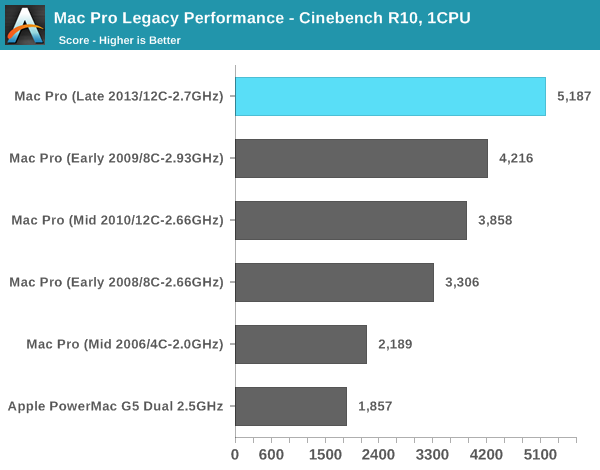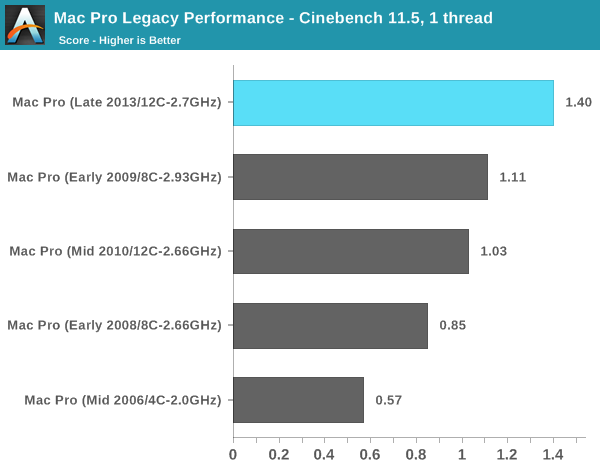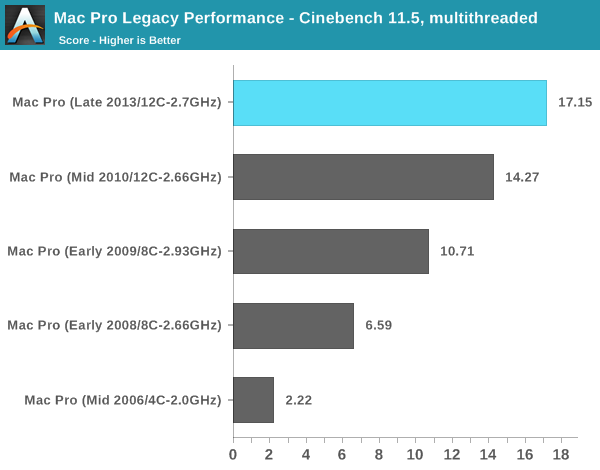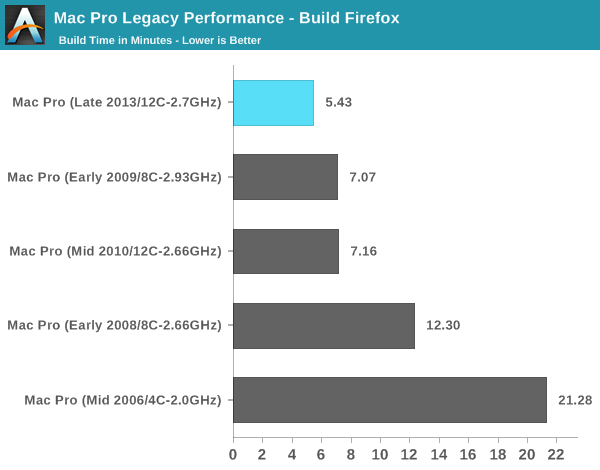The Mac Pro Review (Late 2013)
by Anand Lal Shimpi on December 31, 2013 3:18 PM ESTCPU Performance
I like to have large historical databases of performance so I can put new products in perspective. The Mac Pro and its funny lineage make this a little difficult. For starters, I simply haven't reviewed all of the Mac Pro CPU combinations that have existed over the years. Then there's also the fact that not all of my Mac suite applies well to a 12-core/24-thread Mac Pro. I'm going to try my best to put the new Mac Pro's performance in perspective, but it's going to require a couple of subsections.
Let's first start with a look at the historical performance of the Mac Pro. I really have to thank @elfurberino and @tapbot_paul for lending their time (and their Mac Pros) to help flesh out this comparison. With their help I managed to put together performance data for almost every single generation of Mac Pro.
We'll start with Cinebench R10's single threaded test. Unfortunately the benchmark crashes on Macs with 16+ threads so single threaded performance is all we'll be able to look at:

That's right, I still have my old PowerMac G5 Dual 2.5GHz (upgrade from my original 2.0 model). It's interesting to note that single threaded performance has only improved by 2.8x over that 2.5GHz dual G5 machine from around a decade ago. If we were able to also look at multithreaded performance we'd see a much larger gap. The dual G5's multithreaded performance is actually lower than the single threaded performance of the new Mac Pro's IVB-EP (3346 vs 5187). And the new Mac Pro has 12 of those cores.
Here you can see a very healthy increase in single threaded performance over the 2010/2012 12-core system. The 34% increase in performance is because the Mac Pro never got the Sandy Bridge bump. All previous Mac Pros topped out at Nehalem/Westmere. Couple all of the Sandy Bridge improvements with the much higher peak clock speeds (3.5GHz vs. 3.0GHz) and the performance gains make sense.
The 8C system from early 2009 gives us an example of how it's very possible to have a newer Mac Pro actually perform worse than its predecessor. Apple has done a relatively good job this round of keeping the core count/frequency tradeoffs sensible, but you still have to align your silicon choices to your workload.
Moving on to Cinebench 11.5, we lose the PowerMac G5 comparison but we gain a more modern benchmark. Once again we'll start with the single threaded numbers:

There's that healthy single threaded performance bump again. It is pretty incredible to me just how far we've come in single threaded performance since the mid-2000s. What's even crazier is that 2.0GHz Mac Pro from 2006 is only about 40% faster than a Bay Trail tablet with an Atom Z3770.

The multithreaded story is more evolutionary for sure, especially compared to the previous generation 12-core model. Here we're showing a 20% gain over the previous 12-core design. If you're migrating from a machine with fewer cores you can expect a corresponding increase in multithreaded performance. What is most surprising here is that a 2.3GHz 15-inch MacBook Pro with Retina Display (Late 2013) actually offers better multithreaded performance than the 8-core 2.66GHz Mac Pro from early 2008 in the chart above. The new 15-inch rMBP scores a 6.62 here compared to the 6.58 of that old Mac Pro.
I also shared my Firefox build test with Adam and Paul, who helped me fill out the chart below:

There isn't much of an advantage to having 12 cores here, but the new Mac Pro does deliver an amazingly quick build time compared to anything else. The new Mac Pro is good for around a 24% improvement in build performance compared to the outgoing 12-core model.










267 Comments
View All Comments
Ryan Smith - Tuesday, December 31, 2013 - link
Yes. 1 and 3 are on the same TB controller.JlHADJOE - Tuesday, December 31, 2013 - link
You, sir, are a very hardworking man.Thanks very much for the review, and a happy new year to you.
scribblemonger - Tuesday, December 31, 2013 - link
"The part I haven’t quite figured out yet is how Apple handles DisplayPort functionality. All six Thunderbolt 2 ports are capable of outputting to a display, which means that there’s either a path from the FirePro to each Thunderbolt 2 controller or the PEX 8723 switch also handles DisplayPort switching. It doesn’t really matter from an end user perspective as you can plug a monitor into any port and have it work, it’s more of me wanting to know how it all works."The former is correct.
funwithstuff - Tuesday, December 31, 2013 - link
Could you please share more details of your FCP X benchmarks? I'd like to analyse where the pain points are in for different Macs.funwithstuff - Tuesday, December 31, 2013 - link
And also, a quick typo fix. In the article you say you're testing the iMac 2013 i5-3.4GHz, but the charts all say i7-3.4GHz.macgeeky - Tuesday, June 3, 2014 - link
Anand, which is it: are you testing the iMac Late 2013 i5 or i7?Thanks!
AnTech - Tuesday, December 31, 2013 - link
Apple should bring these to match the Mac Pro:- Thunderbolt 2 matte display (24-inch) 4K and 3D with USB 3 and SD card reader.
- Wired extended keyboard with USB 3 hub built-in.
miahshodan - Tuesday, December 31, 2013 - link
Doesn't having external storage kind of negate the entire clean and small design? I would rather have a larger case with my extra drives in it and no messy cables all over my desk.Gigaplex - Wednesday, January 1, 2014 - link
Yes. Yes it does.nedjinski - Tuesday, December 31, 2013 - link
I guess you're using FCP as the reference for benchmarks because it is mac exclusive. Since most really serious video editor pros have migrated to Premiere it would be interesting to see if the numbers were different or better using that as your reference.